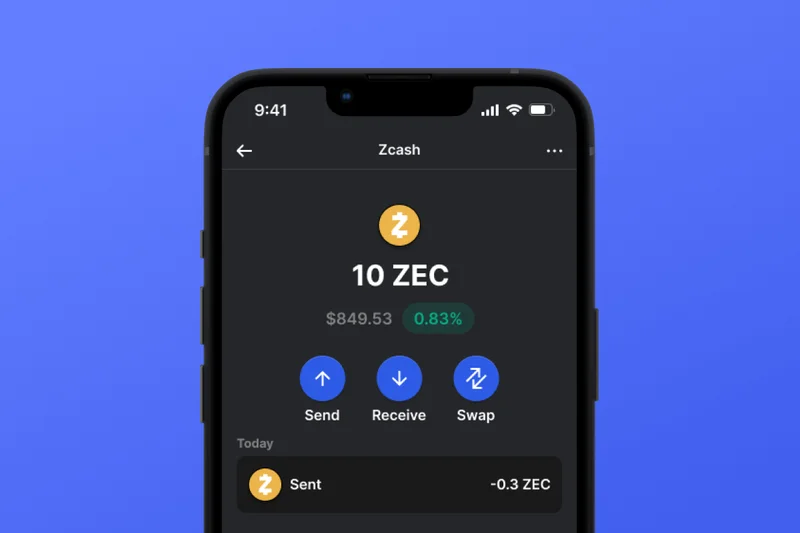Zcash's Market Cap Surge: Cypherpunk Principles and Hyperliquid's Fall
"Encrypted Bitcoin": Genius Move or Privacy Pipe Dream?
Zcash is having a moment. Up nearly tenfold in two months, and recently surpassing Hyperliquid in market cap, the privacy-focused crypto is being touted as "encrypted Bitcoin," a return to cypherpunk principles. Is this surge justified, or just another flash in the pan fueled by regulatory crackdowns and clever marketing? Let's dig into the numbers.
Cracking the Code: Zcash's Privacy Play
The core argument for Zcash's resurgence rests on the growing unease around Bitcoin's transparency. As Galaxy Digital's Will Owens points out, Bitcoin ETFs haven't made the network less transparent; they've just added layers of intermediaries. Zcash, with its shielded transactions using zero-knowledge proofs, offers a different approach. The idea is simple: obscure the flow of funds, making on-chain surveillance more difficult.
This appeal is amplified by the U.S. government's increasing scrutiny of Bitcoin privacy tools. The recent legal troubles of Samourai Wallet and Wasabi Wallet (the latter preemptively banning U.S. customers) have left a vacuum in the market. Zcash is stepping in, promising a haven for those seeking financial anonymity.
But here's the rub: Zcash's privacy features are optional. Users have to actively choose to "shield" their transactions. Owens notes that about 30% of the Zcash supply is currently shielded. That’s a decent chunk—but what about the other 70%? How much of the daily transaction volume is actually shielded? Details on that specific metric are surprisingly hard to come by. If most transactions are unshielded, the "encrypted Bitcoin" narrative starts to crumble.
The argument is that the larger the shielded pool, the harder it is to trace flows. Think of it like a crowded room: the more people there are, the harder it is to pick out a single voice. But a crowded room with only a few people whispering secrets isn't very secure.
Momentum or Mirage?
The recent price surge is undeniable. Zcash went from around $40 to nearly $400 in a couple of months. (To be exact, it hit a seven-year peak of $376 in October, according to CoinGecko.) But is this organic growth, or is it driven by hype and speculation?

Mert Mumtaz, CEO of Solana infrastructure firm Helius Labs, has been a vocal advocate for Zcash, stating that "shilling privacy stuff" makes a difference. While endorsements from influential figures in the crypto space certainly matter, they don't guarantee long-term success. We need to see sustained adoption and usage of Zcash's privacy features, not just price appreciation.
It's also worth noting that other privacy-focused cryptos, like Dash and Decred, have also seen significant price jumps recently. This suggests a broader trend of renewed interest in digital asset anonymity, rather than something unique to Zcash. Dash, for example, soared 162% to $122 in a week. Decred jumped 139% to $41 over the same period. Are these surges correlated? Probably. Are they sustainable? That's the billion-dollar question.
And this is the part of the report that I find genuinely puzzling. Zcash's fundamentals, as Owens himself admits, haven't recently changed. The technology is the same as it was before the price surge. So, what has changed? The perception, apparently. But perceptions can be fickle. As reported by Crypto Briefing, Zcash surpasses Hyperliquid in market capitalization.
Privacy's Price: A Fool's Errand?
Zcash's surge reflects a desire for greater privacy in a world of increasing surveillance. But the long-term viability of Zcash, or any privacy-focused crypto, hinges on its ability to balance anonymity with regulatory compliance. As governments crack down on illicit activities involving cryptocurrencies, privacy coins will face increasing scrutiny.
The fundamental problem is this: complete anonymity is a double-edged sword. It can protect legitimate users, but it can also be used to facilitate illegal activities. Finding the right balance between privacy and security is the key. Whether Zcash can strike that balance remains to be seen.
A Return to Sanity?
Zcash's price jump is a reminder that the market isn't always rational, but eventually the numbers catch up.
-

Warren Buffett's OXY Stock Play: The Latest Drama, Buffett's Angle, and Why You Shouldn't Believe the Hype
Solet'sgetthisstraight.Occide...
-

The Business of Plasma Donation: How the Process Works and Who the Key Players Are
Theterm"plasma"suffersfromas...
-

newsmax: What's going on?
[GeneratedTitle]:AreWeReallyS...
-

Mantra: A Quantitative Look at the Psychology and Actual Impact
AnAnalysisof'Mantra'asaFunct...
-

Bittensor: The Decentralized AI Vision and Why Wall Street is Suddenly Watching
Ofcourse.Hereisthefeatureart...
- Search
- Recently Published
-
- Firo: what it means for our future
- Rocket Launch Today: Did It Actually Go Up? SpaceX, Blue Origin, & The Latest Propaganda
- Dijon: Unpacking the Artist, His Vision, and the SNL Buzz
- Satoshi Nakamoto: Unraveling the Visionary, Defining 'Satoshi,' and Bitcoin's Future
- Cook County Treasurer: Property Tax Bills, Payments, & Why It's Such a Pain
- Allora: The Next Paradigm Shift and What It Means for Humanity
- IRS Relief Payment 2025: Will You Actually See a Direct Deposit?
- The Great Hamburger Collapse: The Real Reason They're Failing and Who's Next
- Nasdaq Composite Rises: What's Driving the Rally and Key Stock Movers
- Zcash's Price Surge: An Analysis of Its Price, Key Endorsements, and Future Outlook
- Tag list
-
- carbon trading (2)
- Blockchain (11)
- Decentralization (5)
- Smart Contracts (4)
- Cryptocurrency (26)
- DeFi (5)
- Bitcoin (29)
- Trump (5)
- Ethereum (8)
- Pudgy Penguins (6)
- NFT (5)
- Solana (5)
- cryptocurrency (6)
- XRP (3)
- Airdrop (3)
- MicroStrategy (3)
- Stablecoin (3)
- Digital Assets (3)
- PENGU (3)
- Plasma (5)
- Zcash (6)
- Aster (4)
- investment advisor (4)
- crypto exchange binance (3)
- SX Network (3)
